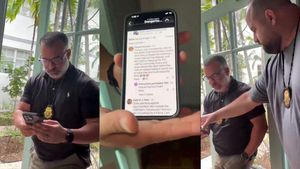If you have ever watched TV’s The Doctors, you know that Dr. Rachael Ross likes to have frank, honest discussions about sex. She was just as straightforward with HIV Plus when she recently spoke to us about how her heightened risk for HIV, why she promoted the rapid at-home test for National HIV Testing Day, and why there’s nothing more liberating than knowing your status.
You’re a family medicine doctor. How often do you encourage your patients to get an HIV test?
I encourage everyone between the ages of 13 and 65 be tested for HIV at least once a year.
Is that across the board—gay, bi, and straight patients?
The patients I encourage to get tested more than once a year are the ones engaged in what some may call “risky sexual behavior.” That’s anyone having unprotected sex of any type with anyone. In recent years, among the African-American and Latino communities, the HIV transmission rates have increased significantly, to the point that minorities are the picture of HIV. If you’re sexually attracted to people in the high-risk groups, that means you want to be more diligent about it. And since I’m an African-American female, I’m at risk to contract HIV [so] I get tested at least twice a year, and I encourage other African-American women to do the same. And that’s not because I’m out there having sex with lots of different people, but studies and statistics show that this is where the virus is concentrated and that the groups of people I am most attracted to tend to be infected as well.
Can you tell me about your first HIV test?
My first was when I was in college. And when I was in college, it was more of a thing for white gay males, and it was marketed as such. So at that time, when I went to get an HIV test, it was more of a symbolic thing. I didn’t think I had it, and no one would have thought I had it. It’s interesting to contrast that with college-age people now, because it’s completely different. They’re having sex around 13 or 14, and when I was a kid, that wasn’t the case. So, when I think about that first HIV test, there wasn’t a lot of anxiety around it. There’s more fear now when I take one, versus when I first had one.
How can we make HIV testing part of regular sex education?
Our conversations around sex need to be more casual, and they need to start earlier. Parents and school systems are really scared about the issue because of the backlash. But we really have to remember that young people are exposed to sex at an earlier age now because of the Internet and television and for what our songs say, so we have to use those instances as teachable moments, as opposed to letting them just interpret it through their own lenses or through their friends. We need to start integrating discussions about sex into our dialogue and stop being so afraid of it. These talks really need to start in infancy and when kids are toddlers.
How does something like the at-home HIV test change things?
Just because something becomes more available doesn’t mean that society necessarily thinks there’s a need for it. HIV is becoming what’s considered a chronic illness. Studies are showing you can live into your 60s, which is as long as anyone else would, while living on HIV meds, but back in the [1980s] and ’90s, this was killing a whole generation of people. Now you can catch it and take your medication and live happily ever after for some years.
So the fear is gone?
So I think what that’s done has decreased awareness and decreased the perceived need to test. And you have people out there who think they really don’t have it and they really don’t need to get tested. But what I’m really excited about OraQuick coming on the scene is that it is reintroducing the conversation around testing, and who needs to come in for testing. In my own practice it’s not the prostitutes who get HIV, it’s not people who go out to Vegas every weekend and hook up with someone different every time. It’s people in stable relationships, it’s people doing “respectable behaviors.” So, when you think of it in those terms, there are more people at risk than we’re willing to think. I’m hoping that with OraQuick being on the shelves and being everywhere, it’s reintroducing a conversation we need to have on what is risky sexual behavior and what isn’t, and you need to know your own status just as well as your partner’s. OraQuick is helping couples who would otherwise have to figure out when to take off work to go into a clinic together and get tested together. What I’m so excited about OraQuick is that you don’t need to be on anyone else’s schedule.
Can getting tested for HIV improve your sex life or at least your relationship with your partner?
Absolutely! There’s nothing more liberating than walking through the streets knowing that you don’t have an STD. When you feel free like that, it’s going to make you feel sexier, and knowing whether your partner does or doesn’t have HIV will make you feel better. Knowing your status can free you to go to other limits that you can’t when you’re sitting there worried about your partner’s status. I encourage all couples to get tested together for STDs. You want to make sure about chlamydia, gonorrhea, herpes, and everything, because at the end of the day, it’s not just HIV that you’re worried about, but HIV tends to be the one that can take you out the quickest.
So really being aware of what you’re carrying around in terms of viruses or diseases can help you feel sexier, and there’s nothing like that feeling during sex, because you can then orgasm, you can be free, you can scream louder, sweat doesn’t bother you, someone’s juices don’t bother you. It removes these hang-ups that we have during casual sex, like, “Oh, no! Don’t spill the condom!” There are all these things that you’re worried about—“Where’s the dental dam?”—that can be removed when you’re in a monogamous relationship and you’re both 100 percent sure of each other’s statuses.







































































